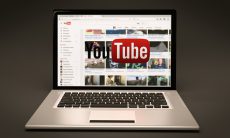The best thing about social media marketing is that you don’t have to be the most popular, have the most followers, or be the most sophisticated, you just have to do a better job than all your direct competitors. You don’t have to be the fastest, the biggest, or the strongest in order to win at social media, you just have to be faster than Mark. Who is Mark? Well, I am sure you’ve all heard the joke about outrunning a bear…
Steve and Mark are camping when a bear suddenly comes out and growls. Steve starts putting on his tennis shoes. Mark says, “What are you doing? You can’t outrun a bear!” Steve says, “I don’t have to outrun the bear–I just have to outrun you!” (via Boy’s Life)
In social media, you don’t have to outrun the bear, you just have to outrun your competitors — your real competitors, not your aspirational competition.
The problem with social media is that it removes all barriers to entry — meaning anyone and everyone can enter a globally competitive marketplace of brands, celebrity, popularity, and ideas; a marketplace where the competition is absolute and there is a global best and worst.
There are top-100 lists on Technorati, there is Guy Kawasaki‘s AllTop lists, there’s the Top Twitter list — dominated by top global celebrities, actors, musicians, and sports figures — and the top social media influencer lists, including the enigmatic Power150 list from AdAge. It is all so intimidating and hopeless, right?
Well, no. Ashton Kutcher is probably not your direct competition, nor is Charlie Sheen. If you’re not a public figure or a national brand, you need to give yourself a break and just focus on outrunning Mark — outrunning the folks to your left and to your right; the folks who are realistically eating your lunch or taking market share from your bottom line. I mean, even I am always fighting my desire to chase social media celebrity.
For example, I used to consider Chris Brogan a competitor, of sorts. Truthfully, Chris is a bear — an awesome bear, a generous bear, but a bear none-the-less. He has 205,232 followers on Twitter and a Klout score of 77. In comparison, I “only” have 47,000 followers on Twitter and a Klout score of 66; Chris has a couple books under his belt and always ends up on the top-ten of every and all social media, marketing, and even web celebrity lists.
As an aside, I do realize that 47,000 is a lot of followers and 66 is a pretty good Klout score — please bear with me because we’re all comparing ourselves to other folks who are prettier, richer, skinnier, taller, smarter, and stronger — just realize that I don’t consider 47k or 66 to be good scores just like Chris probably wants 500k followers and a Klout score above 80 — it’s just how we all feel, right? Not just you.
Chris and I are old friends but were I to judge my success or failure based on the strength, power, and awesomeness of a bear like Chris Brogan or Guy Kawasaki I would be constantly frustrated by my progress, in the same way that folks who look to my relative success on social media as intimidating — it is all relative and it is all worthwhile.
What’s even more worthwhile is to aspire to become friends with the bears. Though I have “only” 47,000 followers on Twitter, I do know enough very big social media grizzlies through all of my hard work, sharing, participating, being present, generous, and consistently there as part of the conversation, that I can get help if I need it from bears who are much bigger, much smarter, and more powerful than I am, be they individual influencer powerhouses like Gary Vaynerchuk or even influential brands.
Let me close by sharing that it is indeed worthwhile to build your numbers and your size as a social media influencer — I will not take that back — but you really don’t have to be a lot bigger — you don’t have to be the biggest; however, all the time, energy, and dedication that you spend on building your core friends, followers, and likers will never go to waste because these connections are valuable — especially if you spend time and energy required to build and strengthen these tacit relationships into proper friendships.
First spend all the time and energy required to become faster than Mark — to become faster than your competition — and then, when you’re the fastest, strongest, and most influential member of your real competition group, then start actively becoming friends with the bears.
Let me change the joke a little bit: Steve and Mark are camping when a bear suddenly comes out and growls. Steve just sits there. Mark says, “What are you doing? Aren’t you going to run?” Steve says, “I don’t have to run–the bear doesn’t want to eat me!”
Learn more about Chris Abraham at Gerris digital.




